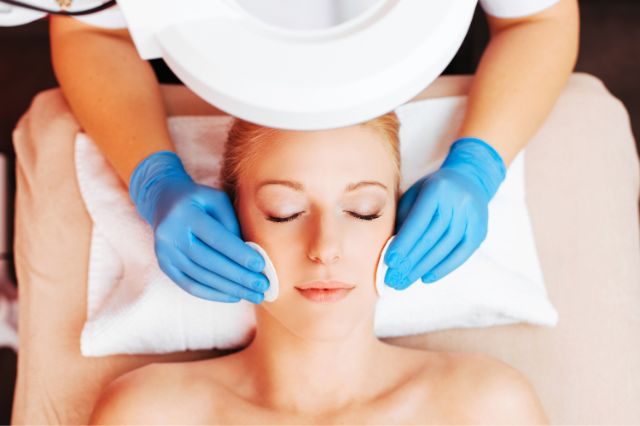Your skin is super important. It’s like a protective shield, helps control your body temperature, and is key to staying healthy.
Your skin deserves the best care, and we’re here to help you achieve that.
To keep your skin in tip-top shape, experts have some great advice. In this article, we’ll go over the top 10 tips for healthy skin that dermatologists and skincare experts recommend.
Let’s start this journey to healthy and happy skin together!
1. Protect Your Skin from the Sun
One of the most important things for taking care of your skin is to keep it safe from the sun. The hot sun can harm your skin and make it age faster, give you sunburn, and even raise the chances of skin cancer.
To keep your skin safe from the sun, use sunscreen that says “broad-spectrum” on the label and has an SPF of at least 30, as recommended by experts. Put it on 15 minutes before going outside, and then put more on every two hours if you’re in the sun.
Wearing clothes that cover your skin, sunglasses, and big hats can help protect your skin even more.
2. Stay Hydrated
Water is like a magic potion for your skin. It makes your skin not dry and itchy.
Experts say you should drink about 8 to 10 glasses of water every day. But sometimes, you might need more, especially if it’s super-hot outside or you play a lot.
When you drink enough water, your skin becomes soft and strong. It’s like a shield against dry, flaky, or irritated skin.
So, drink water to keep your skin happy and healthy. It’s good for your insides and your outsides!
3. Cleanse and Moisturize Regularly
Taking care of your skin involves two important steps: cleansing and moisturizing.
- Cleansing: This is like giving your face a good wash. It helps clean your skin by removing things like dirt and oil that can make it look dirty. For best results, use a gentle cleanser that fits your skin type, whether it’s oily, dry, or sensitive.
- Moisturizing: Think of this as giving your skin a drink of water. It helps to keep your skin from getting too dry. After you’ve washed your face, put on a moisturizer that’s right for your skin. This will help your skin stay healthy, prevent it from getting dry, and stop it from feeling irritated.
4. Maintain a Healthy Diet
The things you eat affect how your skin looks and feels. Skin doctors (called dermatologists) suggest eating lots of fruits, vegetables, and whole grains because they have important vitamins and minerals that make your skin better.
Foods with things called antioxidants, like vitamins C and E, are great for shielding your skin from the sun and other bad stuff.
Also, stuff like fish and nuts has something called omega-3 fatty acids, which keep your skin strong and lower any redness or swelling.
So, eating these kinds of foods can help your skin stay healthy and look good.
5. Limit Sugar and Processed Foods
Eating lots of sugary and processed foods isn’t good for your skin. Here’s why:
- Inflammation: These foods can make your skin problems like acne and eczema worse because they cause your body to get upset and inflamed.
- Ageing Faster: Sugar can make your skin age faster. It’s like sugar messes up the stuff that keeps your skin young and smooth. So, if you eat too much sugar, your skin might get wrinkled and loose.
To have nice, healthy skin, it’s a good idea to eat less sugar and stay away from highly processed foods. Your skin will stay looking good if you do that!
6. Get Sufficient Sleep
Getting a good night’s sleep is like giving your skin a beauty treatment.
When you sleep, your body fixes and makes new skin cells, so your skin looks healthy and nice. But if you don’t sleep enough, your skin can look tired, with dark circles under your eyes and puffiness. It may even look dull, not bright and lively.
To make your skin look its best, try to get 7-9 hours of good sleep each night. It’s like a natural way to help your skin stay pretty and fresh.
So, don’t forget your beauty sleep!
7. Manage Stress
When you’re really stressed for a long time, it can make your skin unhappy. This Stress can cause problems like pimples, itchy patches, and dry skin.
Stress also makes your body release hormones that can make your skin more oily and make pimples worse.
To reduce stress, experts recommend trying activities like yoga, meditation, taking deep breaths, or doing things you love as hobbies. This can make your skin and your mind feel better.
8. Avoid Smoking and Limit Alcohol
Excessive Smoking and drinking Alcohol habits can make your skin age faster.
Smoking makes the blood vessels in your skin smaller, so less blood and nutrients can reach your skin. This can cause your skin to become saggy, wrinkled, and look tired.
Too much Alcohol consumption can make your skin dry, and the blood vessels in your face might become big, causing redness and tiny broken blood vessels.
It’s best to quit smoking and not drink too much Alcohol to keep your skin healthy.
9. Establish a Skincare Routine
Taking good care of your skin every day can make it healthier and look better. Here’s what you can do:
- Use a mild cleanser to clean your face gently.
- Use a toner to make sure your skin is at the right balance.
- You can use special serums and creams for spots or eyes, depending on what your skin needs.
- During the day, put on sunscreen to protect your skin. At night, use a moisturizer to keep your skin hydrated.
- Select skin care products that are right for your skin type and address the specific issues you want to improve.
10. Consult a Dermatologist
A dermatologist is a special doctor who knows a lot about skin. If your skin has issues like pimples, red spots, or signs of getting older, you can visit a dermatologist. They can figure out what’s wrong and tell you what to do to make your skin better.
It’s a good idea to see the dermatologist regularly, like going to the doctor for a check-up. This way, if there’s something not right with your skin, they can fix it before it becomes a big problem. This will help keep your skin healthy and looking good.
So, remember to see a dermatologist to keep your skin in top shape. Your skin will be happy, and you’ll feel great!
Conclusion
To wrap it up, following these ten expert-recommended practices for healthy skin can help you keep your skin looking good and feeling great.
Using sunscreen, staying hydrated, eating well, and being consistent with your skincare routine are all important. Avoiding things like Smoking and harsh treatments can make a big difference, too.
Now, we want to hear from you. Have you tried these tips? What problems did you face? Are there any more skin questions or things you’d like to know?
Share your thoughts and questions so we can help you have great skin!
Bundle of thanks for reading the tips!



Leave a Comment